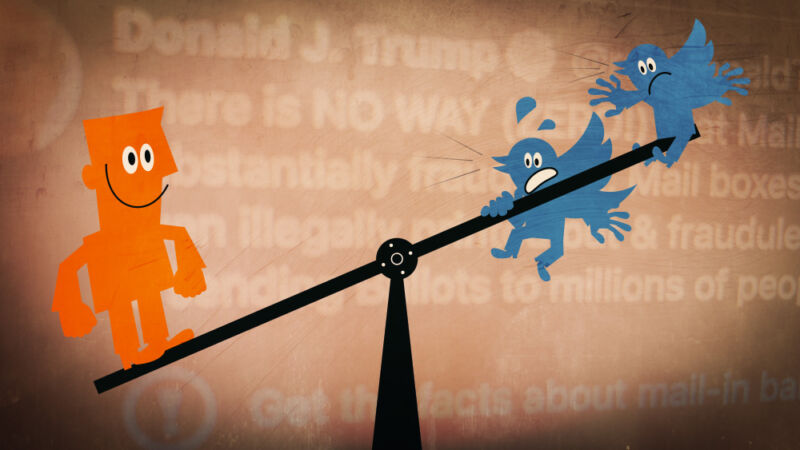
Twitter's newest fact-checking initiative, which slaps warnings on misleading posts by major public officials, appeared on arguably the biggest possible account in North America on Tuesday: President Donald Trump.
Earlier that day, Trump used Twitter to allege that mail-in voting is inherently "fraudulent." Hours later, his posts were updated by Twitter to include a clickable, plain-text notice—"get the facts about mail-in ballots"—next to an exclamation-point icon.
Clicking that notice directs users to a page that cites "CNN, Washington Post and other fact checkers" in disputing the president's Tuesday-morning allegation. But before the Twitter page links to these citations, it opens with what appears to be entirely original language, as opposed to a quote from a press outlet:
Trump falsely claimed that mail-in ballots would lead to "a Rigged Election." However, fact-checkers say there is no evidence that mail-in ballots are linked to voter fraud. Trump falsely claimed that California will send mail-in ballots to "anyone living in the state, no matter who they are or how they got there." In fact, only registered voters will receive ballots. Though Trump targeted California, mail-in ballots are already used in some states, including Oregon, Utah and Nebraska.
A Twitter representative confirmed in an email to Ars Technica that this fact-checking page is "created and managed by our global curation team," as opposed to being made up of language from other writers or outlets. Twitter directed us to that team's curation style guide.
-
As of press time, Trump's Tuesday morning posts about mail-in voter fraud include plain-text, clickable notices, advising users to "get the facts."
-
Clicking these brings up a lengthy, scrolling feed that revolves around Twitter's fact-check. Anything not specifically credited to an outside agency or outlet is written by Twitter's global curation team.Twitter
-
"What you need to know." Again, these bullet points are written by Twitter's global curation team.Twitter
-
After those, the scroll adds formal citations from newspapers and other outlets.Twitter
“Such a horrible thing”
In terms of timing, Twitter's application of a fact-check label came on the same day critics called out another bizarre post from the president: an indirect accusation of murder. Roughly one hour after decrying mail-in voting, Trump used his Twitter account to mention "the opening of a cold case" relating to MSNBC host Joe Scarborough and then asked "whether or not Joe could have done such a horrible thing." This vague post isn't Trump's first time hinting to the death of a Scarborough staffer in 2001—and, once again, he has danced around direct language to avoid making a specific accusation.
This is likely the reason Twitter declined to take action, including the use of any warning labels, against the Scarborough-related post. As the company's representatives told NBC News on Tuesday:
We are deeply sorry about the pain these statements, and the attention they are drawing, are causing the family. We've been working to expand existing product features and policies so we can more effectively address things like this going forward, and we hope to have those changes in place shortly.
Meanwhile, the fact-check notice on Trump's tweet appears to be the social media network's latest attempt to maintain its controversial policy of leaving posts by "world leaders" untouched, even when they appear to clearly violate Twitter's rules. Whether attaching a fact-check notice to a controversial tweet will work in Twitter's favor remains to be seen, especially since Trump has yet to publicly respond to Twitter's decision as of press time.
2020 has seen Twitter experiment with plain-text warning labels for other reasons. As a previous major example, a post from the White House containing doctored video of US presidential candidate Joe Biden received a Twitter-generated warning that described the post as "manipulated media."Update, 9:11pm ET: Trump has shot back at Twitter, alleging that the social network's application of a fact check is tantamount to electoral interference. The president did not clarify exactly which federal statute about election fraud or interference Twitter may have violated. While Twitter did not in any way alter or delete the language in Trump's posts, the president alleged that the social network was still somehow "completely stifling FREE SPEECH, and I, as President, will not allow it to happen!"
reader comments
441